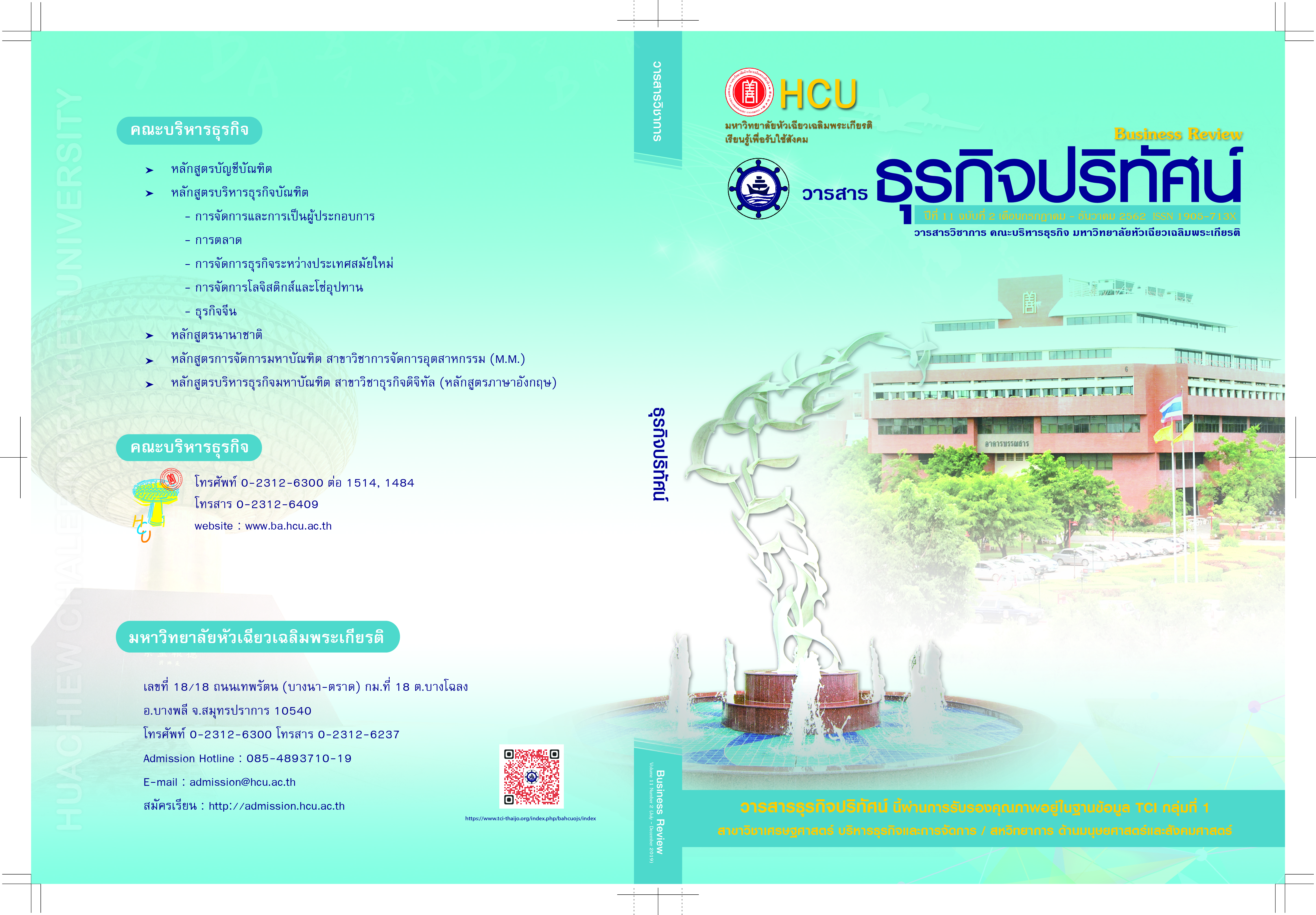Factors Model Influencing Competitive Advantage of Thai Palm Oil Industry
Keywords:
Operations Management, Green Supply Chain Management, Competitive Advantage, Palm Oil IndustryAbstract
This research of purpose was to study the factors influencing of the variable of competitive advantage of Thai palm oil industry and to develop a model of factors that influence competitive advantage of Thai palm oil industry. The instrument was a questionnaire to collect data from 260 companies of Thai palm oil industry. According to the analysis, it was found that green supply chain management has influence on competitive advantage (coef.= 0.617), with green logistic indicators having the highest values. Operation management has influence on competitive advantage (coef.=0.217), with energy reduction indicators having the highest values. According to the Goodness of Fit Measure, it was found the model fit at Chi-square( ) =41.992, df =29, p =.056, CMIN/DF( /df )=1.448, GFI=.977, CFI=.991, AGFI=.957, NFI=.972 and RMSEA=.036 The final model can explain the competitive advantage with 64 percent (R2 = 0.64).
References
ศูนย์วิจัยกรุงศรี. (2562). Oil Palm Oil Palm (ปาล์มน้ามัน). สืบค้นเมื่อ 4 สิงหาคม 2562, เว็บไซต์: https://www.krungsri.com/bank/th/Other/research/industry/industry-outlook.html
ศูนย์วิจัยนโยบายด้านเศรษฐกิจสีเขียว. (2558). อุตสาหกรรมสีเขียว (Green Industry). สืบค้นเมื่อ 10 ธันวาคม 2561, เว็บไซต์: https://progreencenter.org/
ศูนย์สารสนเทศการเกษตร สำนักงานเศรษฐกิจการเกษตร. (2562). สถิติการค้าสินค้าเกษตรไทยกับต่างประเทศปี 2561. สืบค้นเมื่อ 30 พฤษภาคม 2562, เว็บไซต์: https://www.oae.go.th
ศูนย์สารสนเทศการเกษตร สำนักงานเศรษฐกิจการเกษตร. (2562b). สถิติการเกษตรของประเทศไทยปี 2561. สืบค้นเมื่อ 30 มีนาคม 2562, เว็บไซต์: https://www.oae.go.th
สำนักงานปลัดกระทรวงอุตสาหกรรม. (2559). แผนยุทธศาสตร์กระทรวงอุตสาหกรรม พ.ศ. 2560 - 2564 (ฉบับทบทวน). สืบค้นเมื่อ 30 พฤษภาคม 2561, เว็บไซต์: https://www.industry.go.th/industry/index.php/th/
Ang, J. S., Shimada, T., Quek, S. A., & Lim, E. (2015). Manufacturing strategy and competitive performance–an ACE analysis. International Journal of Production Economics, 169, 240-252.
Ben Mahmoud-Jouini, S., & Lenfle, S. (2010). Platform re-use lessons from the automotive industry. International Journal of Operations & Production Management, 30(1), 98-124.
Best, J. W., & Kahn, J. V. (1998). Research in education. 8th ed. Boston: Allyn and Bacon.
Bourlakis, M., Maglaras, G., Aktas, E., Gallear, D., & Fotopoulos, C. (2014). Firm size and sustainable performance in food supply chains: Insights from Greek SMEs. International Journal of Production Economics, 152, 112-130.
Chamsuk, W., Fongsuwan, W., & Takala, J. (2017). The effects of R&D and innovation capabilities on the thai automotive industry part’s competitive advantage: a sem approach. Management and Production Engineering Review, 8(1), 101-112.
Chien, M. K. (2014). Influences of green supply chain management practices on organizational sustainable performance. International Journal of Environmental Monitoring and Protection, 1(1), 12.
Chin, T. A., Tat, H. H., & Sulaiman, Z. (2015). Green supply chain management, environmental collaboration and sustainability performance. Procedia Cirp, 26, 695-699.
Grekova, K., Calantone, R. J., Bremmers, H. J., Trienekens, J. H., & Omta, S. W. F. (2016). How environmental collaboration with suppliers and customers influences firm performance: evidence from Dutch food and beverage processors. Journal of cleaner production, 112, 1861-1871.
Hair, J. F., Sarstedt, M., Ringle, C. M., & Mena, J. A. (2012). An assessment of the use of partial least squares structural equation modeling in marketing research. Journal of the academy of marketing science, 40(3), 414-433.
Koçoğlu, İ., İmamoğlu, S. Z., İnce, H., & Keskin, H. (2011). The effect of supply chain integration on information sharing: Enhancing the supply chain performance. Procedia-social and behavioral sciences, 24, 1630-1649.
Leonidou, L. C., Leonidou, C. N., Fotiadis, T. A., & Zeriti, A. (2013). Resources and capabilities as drivers of hotel environmental marketing strategy: Implications for competitive advantage and performance. Tourism Management, 35, 94-110.
Lin, Y. H., & Tseng, M. L. (2016). Assessing the competitive priorities within sustainable supply chain management under uncertainty. Journal of Cleaner Production, 112, 2133-2144.
Likert, R. E. N. S. I. S. (1972). Likert technique for attitude measurement. Social Psychology: Experimentation, Theory, Research, Sahakian, WS (Ed.). Intext Educational Publishers, Scranton, USA., ISBN-13: 9780700223879, 101-119.
Lomax, R. G., & Schumacker, R. E. (2012). A beginner's guide to structural equation modeling. New York, NY: Routledge Academic.
OECD/FAO. (2019). OECD-FAO Agricultural Outlook 2019-2028. OECD Publishing, Paris/Food and Agriculture Organization of the United Nations: Rome.
Okongwu, U., Lauras, M., François, J., & Deschamps, J. C. (2016). Impact of the integration of tactical supply chain planning determinants on performance. Journal of Manufacturing Systems, 38, 181-194.
Muma, B. O., Nyaoga, R. B., Matwere, R. B., & Onyango, J. O. (2014). Green Supply Chain Management and Economic Performance: A Review of Tea Processing Firms in Kericho and Bomet Counties, Kenya. International Journal of Science and Research, 3 (11), 2319-7064.
Porter, M. E. (1985). Competitive Advantage Creating and Sustaining Superior Performance. New York: The Free Press.
Su, H. C., Dhanorkar, S., & Linderman, K. (2015). A competitive advantage from the implementation timing of ISO management standards. Journal of Operations Management, 37, 31-44.
Ward, P. T., & Duray, R. (2000). Manufacturing strategy in context: environment, competitive strategy and manufacturing strategy. Journal of operations management, 18(2), 123-138.
Wong, C. W., Lai, K. H., & Bernroider, E. W. (2015). The performance of contingencies of supply chain information integration: The roles of product and market complexity. International Journal of Production Economics, 165, 1-11.
Yusuf, Y. Y., Gunasekaran, A., Musa, A., El-Berishy, N. M., Abubakar, T., & Ambursa, H. M. (2013). The UK oil and gas supply chains: An empirical analysis of adoption of sustainable measures and performance outcomes. International Journal of Production Economics, 146(2), 501-514.
Zhu, Q., Sarkis, J., & Lai, K. H. (2007). Green supply chain management: pressures, practices and performance within the Chinese automobile industry. Journal of cleaner production, 15(11-12), 1041-1052.
Downloads
Published
How to Cite
Issue
Section
License
All articles published in the Business Administration and Management Journal Review are copyrighted by the journal.
The views and opinions expressed in each article are solely those of the individual authors and do not represent those of Huachiew Chalermprakiet University or any other faculty members. Each author is fully responsible for the content of their own article. Any errors or issues found are the sole responsibility of the respective author.




